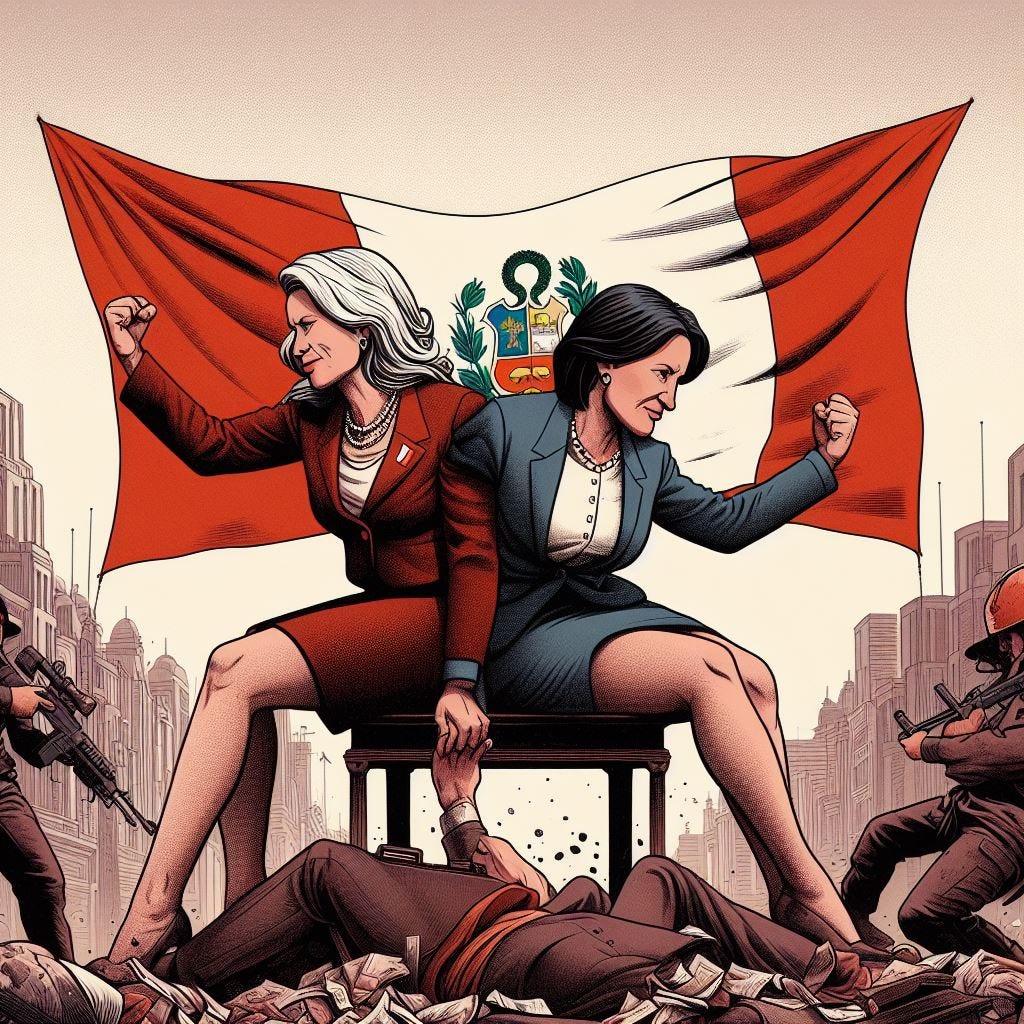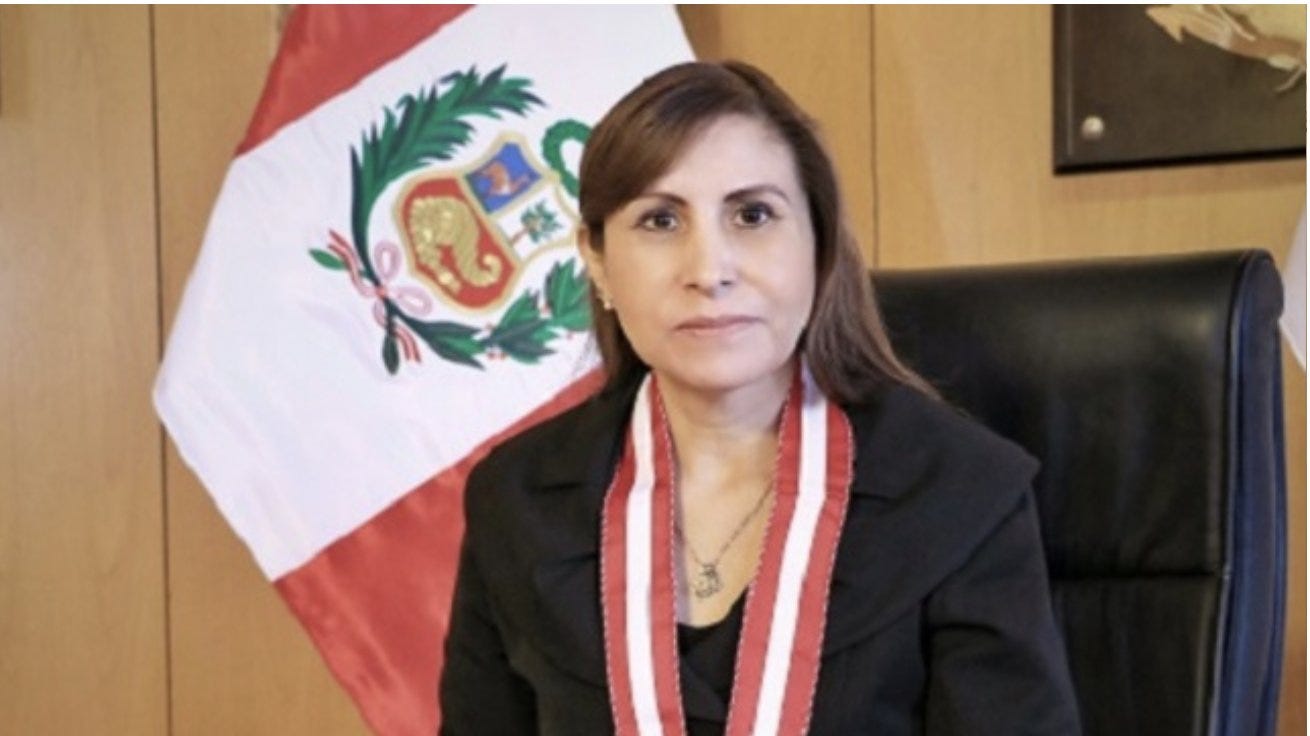A Power Struggle is coming to Peru
Dual charges against the country's top cop and the president have put the two at odds— and could lead to a Constitutional crisis
A developing story in Peru potentially threatens an existential crisis for the government. We decided the situation merits a special explainer with the context you can only get from PWS. Read on for all the details.
Peru entered a dramatic power struggle on Monday as long-standing rivals both revealed criminal charges against one another that implicate both the president, Dina Boluarte, as well as the country’s top prosecutor, Attorney General Patricia Benavides.
The day began with an early morning announcement from one of Boluarte’s allies in Congress, Ruth Luque, that she had filed a Constitutional complaint against Benavides after a special anti-corruption team started an investigation against her closest entourage for allegedly being the leader of a corrupt criminal network.
The context of timing around the accusations, however, is more than a little suspicious. In January, the Peruvian Prosecutor’s Office opened an investigation into Boluarte over her involvement in protester deaths in the wake of the arrest of former President Petro Castillo from office after his failed attempt to dissolve Congress.
Peruvian police were roundly criticized at the time by human rights organizations for a violent crackdown that left at least 40 protesters dead, though some reports put the true numbers as higher.
A special anti-corruption task force accuses Benavides’ closest advisors of being part of a criminal organization "entrenched in the top management of the Public Prosecutor's Office" that sought to "illicitly influence the decisions of congressmen" for the dismissal of the heads of the National Justice Board (JNJ), the appointment of the current ombudsman, Josúe Gutiérrez, and the disqualification of the former Attorney General Zoraida Ávalos— and further effectively accuses them of selling their influence in exchange for shielding several members of Congress from investigations.
Peruvian authorities arrested Jaime Villanueva, former advisor to Attorney General Patricia Benavides, early Monday morning. Two other advisers close to Benavides are also linked to the investigation. Thirty-seven congressmen are allegedly linked to the case.
In response, the Attorney General fired the prosecutor in charge of investigating the allegations against her and accused President Boluarte, Prime Minister Otálora, and three other former ministers of the interior who were in office during the protests for allegedly committing the crime of “aggravated homicide” during the protests.
A series of chats leaked by prosecutors to the press show Villanueva stating that he is the only one authorized to speak on behalf of Benavides and contacting congressmen to influence the vote to disqualify Ávalos.
There are also conversations between Villanueva and several congressmen about the vote to dismiss the members of the National Judicial Council, an institution that opened investigations against Benavides.
A power struggle is born
Both Boluarte and Benavides denounced the allegations against them as baseless and politically motivated.
“We express our condemnation for such a despicable political maneuver that improperly uses the memory of deceased patriots to distract attention from a very serious complaint against the prosecutor herself,” said Boluarte in public statements on Monday.
Benavides rejected the charges against her saying they seek to “destabilize the independence of powers” in Peru.
The power struggle, at least in theory, could lead to both the Attorney General and President Boluarte losing their positions and facing jail time— though the path to get to either outcome (or both) is far from straightforward.
So What happens next?
Boluarte is deeply unpopular— a recent poll put her approval rate at just 8%. But she has managed to stay in power via backroom deals with a deeply corrupt Congress— an arrangement that also protects Congress members, who are nearly as unpopular, and many of whom are corrupt (we covered this dynamic in-depth earlier this year here at PWS).
The accusations against Boluarte can only be presented to Congress since it concerns a matter that occurred during her presidency, so it will be up to Congress to decide whether to accept it for investigation.
Sitting presidents have been removed from office before however, most recently former President Pedro Castillo in 2022, who was charged with rebellion and conspiracy.
Further complicating the matter, Benavides denounced Castillo as part of his removal.
Congress will have to debate over the next few days whether to proceed with the complaint, a decision that could lead to a massive clash between Constitutional powers— and could easily inspire new protests in the process.
Anti-corruption investigators have called for Benavides’ resignation. If she refuses, she could be dismissed by the Superior Board of Prosecutors or the National Judicial Council.
Congress has thus far proven to be ambivalent about Boluarte’s unpopularity— in fact, their fates have been linked in a manner— a sort of mutually assured destruction pact.
But this latest scandal could give them an excuse to withdraw their support. Boluarte may believe she can withstand the political storm, however, and use the power of her office, which she has proven willing to abuse in the past, to push back.
There seems to be evidence for the charges against Benavides and she likely has less chance than Boluarte to remain in her position. But the circumstances of her investigation into Boluarte further cloud an already murky situation.
One thing however is certain, almost exactly a year after her predecessor tried to dissolve the government, Peru is about to enter another tense Christmas season— one that will have deep implications for both the State and the streets.
Don’t forget to hit that like button if you found this useful! It really helps get more eyes on our work!





Thanks for the detailed info. on the situation in Peru. I was there in the tense time when Castillo went down. Peru, and South America in general, is constantly divided by outside interests, especially the U.S. and China. I very well could be wrong but I'd like your thoughts.
Quick question: do you see any way South America will ever become more autarkic as a resource/economic trading bloc? It seems to me that will be the only avenue for achieving anything close to political independence.
Interested in hearing your thoughts.
Cheers
Who does your art? It is fantastic and you get it done somehow in time for a news article.